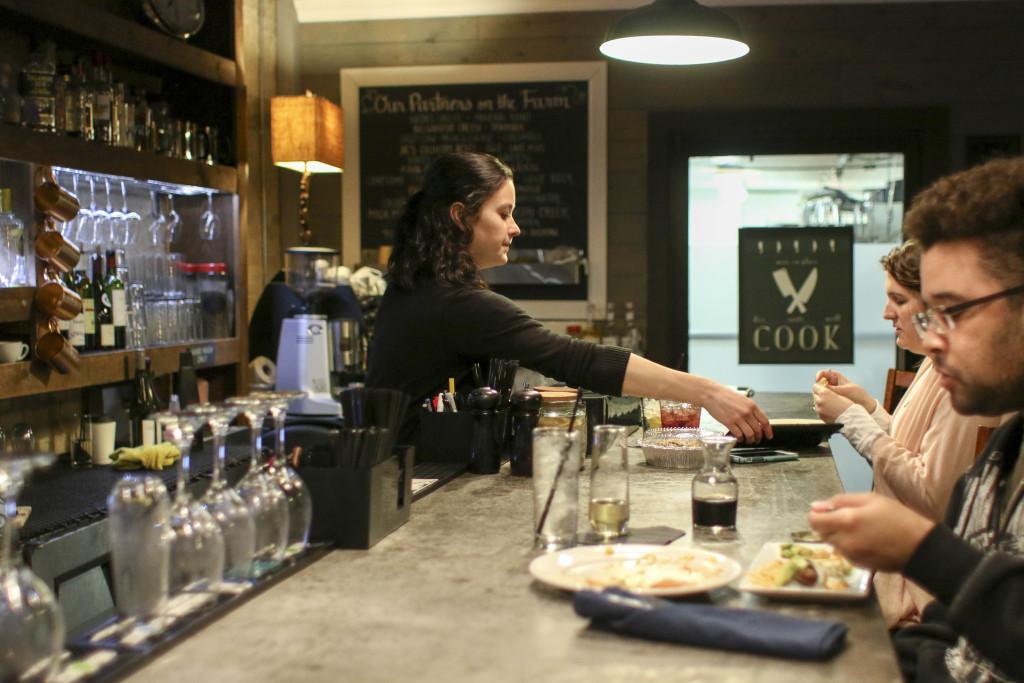
By Kimberly Wethal
Feb. 24, 2016
Professor of economics Russ Kashian said his name might be in a slightly bigger, bolder font on a new study finding UW-Whitewater’s local financial impact, but it’s the students who deserve the credit because they’re the ones who “created the magic.”
The “faculty-organized, student-driven” study focused on finding UW-W’s financial benefit to the community was led by head researcher and sophomore Taylor Griffith. With 10 of her peers and supervision from Kashian, Griffith’s team found the university’s annual economic impact to be $407 million.
Griffith had been involved with the project from the very beginning to the end. She participated in first survey conducted at a Warhawk football game in October, all the way through to its completion, and had gone with Kashian to present the results to Chancellor Beverly Kopper.
Once compiled, the final amount didn’t come as a shock to Griffith.
“It’s an incredible number, but it may not be surprising to me because I saw it every step of the way,” Griffith said. “Thinking about $407 million just in the area without thinking of all the other contextual stuff that went into it, is a lot of money, and is a lot of benefit that can go to not only students, but the families that live in the immediate area.”
The final number is comprised of the university’s spending, which included payroll, investments and supplies, along with any money spent in the community by those affiliated with or visiting UW-W.
Compiling the information once the team had acquired it didn’t take long, Griffith said.
The study only includes revenue that can be compared from year to year, meaning additional revenue generated from construction projects – like Laurentide’s expansion or the building of Starin Hall – doesn’t count, Kashian said.
Kopper said she’s “proud” of the university’s impact on the region in a news release following the announcement of the study last week.
“Not only are we changing lives by offering students robust academic, cultural and athletic experiences, but UW-Whitewater also brings money, employment and volunteerism into the area,” Kopper said. “This economic study further demonstrates what a tremendous investment the campus is for our community and the people of Wisconsin.”
The university also contributes close to $18 million in tax revenue for the state. Visitors attending Young Auditorium shows, athletic events and summer camps contribute $14.6 million, according to the news release.
The study started as two separate projects – a smaller one tracking and estimating the revenue created by the university’s athletic programs by talking to people who attended and tailgated prior to the game, which led to the larger one spanning all of campus’ spending.
“Basically anything that could have to do with their spending in the immediate area, [we tracked],” Griffith said.
Revenue also not counted in the study is the amount of money funneled into the local economy by UW-W alumni who have use their education to help stimulate the community.
The Black Sheep and Causal Joe’s owner and alumnus, Tyler Salisbury, launched his businesses thanks to the time he spent at the university.
It allowed him to build relationships with friends (who then turned around to help him physically build the aspects of his restaurants) and gain a strong footing in the community.
“It’s not because I learned so many things in the classes,” Salisbury said. “Part of it was realizing I’m making friends and relationships, and I’m building connections. Those connections are going to help me through the rest of my life.”
What the study can’t track is the societal and philosophical value the university brings to the community.
“As economists, we don’t qualify those; that’s our failure as economists,” Kashian said. “We try to put dollar signs on things people otherwise couldn’t imagine a value being placed on. It’s only one measurement tool, but it’s one that connects with people. It’s easy to add $1, $2, $3. It’s hard to add smiley faces.”
‘A symbiotic relationship’
If you would have asked Salisbury if higher education was worth it when he was still a college student, he would have told you no.
Now, as the owner of The Black Sheep and Casual Joe’s restaurants, he acknowledges the benefits a degree, in conjunction with being a business-owner in a college town, brings him.
When he first launched his business, his entire staff was comprised of college students, with the exception of him and another employee, who at the time was a recent alum.
The university gives Salisbury a hand by helping him find interns for the office side of the restaurant business, where much of the accounting and operations are managed from.
Many of Salisbury’s customers are UW-W college students and their families.
“That’s what’s so amazing,” Salisbury said. “We talk about financial impact; there’s a huge financial impact because the university supports me and helps me. They provide students and workers, and that’s as important to me as being able to have customers.”
It’s a frequent occurrence that candidates for job openings at UW-W are brought to his restaurant for interview dinners. Salisbury sees a spike in the number of customers walking through the front doors right before a show at the Young Auditorium, or after a large sporting event. Graduations are the first and second-busiest days of the year.
It’s the “symbiotic relationship” between UW-W and the community that keeps many of the businesses thriving, Salisbury said.
“I don’t think we would be in Whitewater if it wasn’t for the university,” he said. “I don’t think the community would be able to sustain what we do here on its own. When students come and visit with their families, and they get a coffee at the SweetSpot, and they come here for dinner, I think that also makes the college attractive.”

